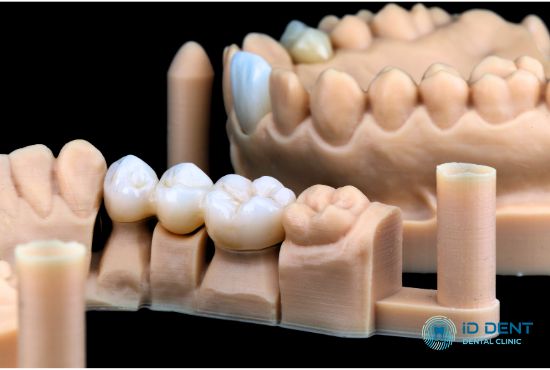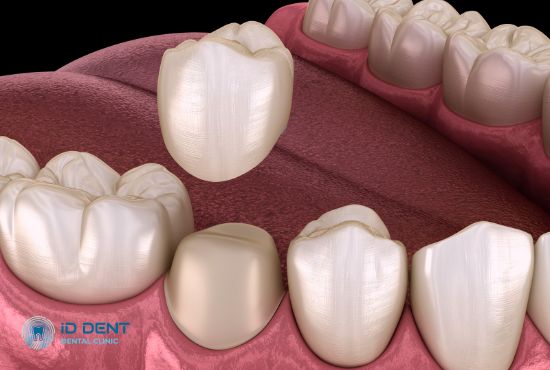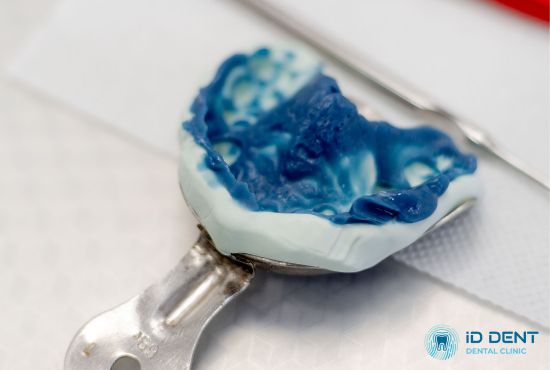Temporary Crowns
Protect teeth after medical procedures and maintain dental aesthetics with temporary crowns. At ID Dent, we provide temporary solutions with excellent results. Consult us today!
| Wearing Duration | no more than 2 months |
| Installation Methods | Direct and indirect methods |
| Main Function | protects against bacteria, infections |
| Usage and Care | proper chewing, without damage |
| Advantages | esthetic, protective function |
| Disadvantages | permeability, esthetic concerns, durability |
| Materials Selection | plastic, composite |
| Handling Limitations | time limits, not for long-term use |

Temporary dental crowns serve various purposes such as safeguarding tooth cavities from infection during treatment stages, maintaining tooth function while permanent solutions are being developed, and more. High-quality materials in temporary crowns allow comfortable eating, speaking, and... Read more
Temporary dental crowns serve various purposes such as safeguarding tooth cavities from infection during treatment stages, maintaining tooth function while permanent solutions are being developed, and more.
High-quality materials in temporary crowns allow comfortable eating, speaking, and oral care. Additionally, those with temporary crowns acclimate faster to permanent ones.
If you need a crown, visit ID Dent in Lesnoy massif clinic. We offer competitive treatment prices, personalized approaches, and support throughout. May your smile remain impeccable!

Temporary crowns are essential in dental treatment, providing temporary tooth restoration and protection. They are used during preparation for permanent crowns. ID Dent ensures your smile’s aesthetics and treatment success. Learn more about temporary crowns from our dentists now!
Purpose and Functions of Temporary Crowns
A temporary crown is a key element in tooth restoration, protecting the mouth during the fabrication of a permanent solution.
Key functions of temporary crowns include:
- protection of tooth tissues from bacteria and microorganisms;
- support of chewing function;
- maintaining a beautiful smile;
- preserving normal occlusion;
- preventing shifting of prepared or adjacent teeth;
- shaping the gum line;
- preventing tissue overgrowth.
Temporary crowns should only be worn while permanent ones are being made, for no more than 2 months. Longer wear risks crown wear and tooth shifting.
Materials for Temporary Crowns
Affordable temporary crowns are often made of plastic, matched to tooth color, but their porous nature makes them susceptible to bacteria. More costly options use composite materials for strength and color stability.
Material choice relies on budget and aesthetic needs. ID Dent dentists will help find the best solution for you.

Pros and Cons of Plastic Crowns
Remember, temporary crowns are not a substitute for permanent ones. They are a short-term solution while waiting for a permanent installation.
Advantages of this choice:
- low cost;
- preventing tooth infections;
- avoiding movement of permanent teeth;
- maintaining a bright smile.
However, plastic temporary crowns also have drawbacks:
- limited adjustment, polishing possible;
- may look less aesthetic;
- less durable;
- limited service life.
Indications for Installation

Temporary crowns may be recommended for:
- Treated tooth protection. After procedures like caries removal or root canal treatment, a temporary crown shields the treated tooth, guarding against molar damage.
- Preparation for a permanent crown. Temporaries restore the tooth while the permanent is made, preserving tooth shape, surroundings, and providing functional and aesthetic repair.
- Aesthetic adjustment. Evaluate aesthetic outcomes, decide on further treatment.
- Post-implant or orthodontic treatment. After implant surgery or during orthodontic care, temporaries restore function and comfort until a permanent crown is placed.
Always consult your dentist about the necessity of temporary crowns, following their advice for your specific requirements.
Contraindications
Temporary crowns might not be suitable if:
- Insufficient tooth structure. When too little tooth remains to secure a crown, its placement is ill-advised.
- Active decay or infection. Crowns may be delayed until infections or decay are addressed.
- Tissue remodeling or healing period. Post-surgery or orthodontic remodeling/healing may delay placement.
- Allergic reaction. If allergic to crown materials and no alternatives exist, a crown is contraindicated.
Discuss all contraindications with your dentist and provide complete health information.
Installation Methods
Temporary crowns can be installed through direct or indirect methods.
- Direct method – creates temporary crown in-office. Impression, preparation, fabrication, and fitting takes about an hour.
- Indirect method – crowns are lab-made, using an impression, creation, and fitting done by a dentist.
Steps for Temporary Tooth Crown Installation

Temporary crown setup entails:
- Dentist preliminarily preps the tooth, removing damaged or decayed tissues.
- Special instruments remove a thin tooth layer, enabling crown space.
- A special material captures an impression.
- Crown fit is assessed and adjusted for correct placement.
- Crown is cemented with special adhesive or temporary glue.
Temporary Tooth Crown Care Tips
After crown placement, follow certain precautions to keep the crown intact and healthy.
Care Tips:
- Avoid hard foods. Past logging hard, sticky foods that damage the crown.
- Gentle brushing. Employ a soft brush, avoiding pressure to preserve the crown. Use floss and interdental brushes for gaps.
- Limit staining foods. Restrict coffee, tea, red wine that discolor the crown.
- Keep appointments. Follow your dentist’s advice for visits and evaluations.
If discomfort, pain, or swelling ensue, alert your dentist. They’ll take necessary actions.
Temporary Crowns Price in Kyiv at ID Dent
Cost varies by materials, dentist expertise, clinical scenario, etc. We ensure our prices are patient-friendly. Check out estimated costs above on the website, or contact our admin for the actual price.
Want an appointment? Private ID Dent clinic in Kyiv provides quality care, ensuring comfort. Schedule a convenient date/time. We’re in Kyiv, Lesnoy massif, near Lesnaya and Chernigovskaya metro. See you there!
References:
- Zhulev E.N. Prosthetic Dentistry. – 2012. – 824p.
- Rosenstiel S.F., Land M.F., Fujimoto Y. Fixed Prosthodontic Treatment. – MedPress Inform. – 2010. – 940p.
- Wulffes H. – Modern Prosthodontic Techniques. – 2002.
Frequently asked Questions
How long can temporary crowns be worn?
Temporary crowns restore tooth aesthetics, prevent gum overgrowth before prosthetics. Typically worn for no more than a month.
Why are temporary crowns installed?
They prevent shifting of treated and adjacent teeth, aid fast acclimatization to crown volume, and fulfill other functions.
How does a temporary crown differ from a permanent one?
Temporary crowns are used during prep/fabrication of permanent crowns. They have a simple design, limited durability versus permanent ones. Not for long-term use.
What if a temporary crown falls off?
Consult a dentist immediately. Don't try re-placing it yourself. A dentist can reset or take needed tooth protection measures.
Can you chew with temporary crowns?
Yes, they provide sufficient chewing function. Avoid very hard, sticky foods that might damage them.
What shouldn't you do with a temporary crown?
Avoid pressure that may displace them. Brush gently and avoid staining foods such as coffee, tea, or red wine to prevent coloring.
Why can't temporary crowns be worn for long?
They're temporary due to material weaknesses in strength and durability. Timely replacement with permanents is vital.
How to clean teeth with a temporary crown?
Use a soft toothbrush, don’t apply pressure to avoid damage. Also use floss and interdental brushes for gaps.
How is a temporary crown placed on a tooth?
Temporary crowns can be direct or indirect. Direct involves chairside creation using impressions, indirect labs fabricate before dentist application.
Can temporary crowns be skipped?
They secure treated teeth, maintain structure, and looks. However, in specific circumstances, temporary crowns aren't mandatory. Evaluate case-by-case with dentists.
What do temporary crowns adhere to?
Dental cement attaches them, providing tooth adherence and functional stability during temporariness.

 Kyiv, st. Bratislavskaya 14B
Kyiv, st. Bratislavskaya 14B Mon.-Fri. 9-20, Sat.-Sun. 10-18
Mon.-Fri. 9-20, Sat.-Sun. 10-18



